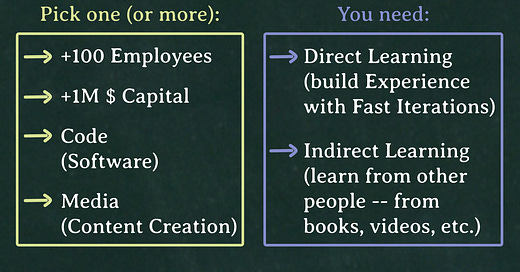Hello Friend!
I was watching an interview (link) of Noah Kagan with Mark Jenney, and Mark said something that reminded me of an insight I first learnt from Naval Ravikant (on The Joe Rogan Experience).
So I thought it would be useful to share the advice from Mark, and then complement it with Naval’s more fundamental views on it.
👤 Authors
💡Nugget
✦ Mark Jenney:
One thing I wish I would have known earlier on in my career and one thing I would kind of go back and tell to a younger version of myself is “make sure you are playing the right game”.
If you're going to build a business—it could be a small business or it could be a massive business—it's going to take about the same amount of effort and energy to become super successful at anything.
And if you're playing the right game, your outcome can be exponentially better than if you're playing the wrong game.
Example of a small-upside business...If your goal is basically just to open one restaurant… You're very limited in what your upside is.
Example of a big-upside business...If you want to go and build a software company… Then obviously you can build a billion dollar business.
The Restaurant VS. the Software Company...Both of those—the owner of the restaurant and the owner of the software company—they're both going to work really hard.
They're both going to put all of their energy, all of their effort into their business to make it as successful as they can.
But they're going to have very different outcomes—if they're both successful:
[Big-upside business]
One is going to have a life-changing amount of income and they are gonna probably become very very wealthy from it. And it could be even generational wealth.
[Small-upside business]
And the other one… They might have worked themselves into a successful job that maybe allows them to pay for pay the bills. But it doesn't have the same type of outcome.
Video Clip → Mark Jenney with Noah Kagan (timestamp range: 34:00 - 37:00)
✦ Naval Ravikant:
We like to view the world as linear → “I'm gonna put in eight hours of work, I'm gonna get back eight hours of output”.
Doesn't work that way.
The guy running the corner grocery store is working just as hard or harder than you and me.
How much output is he getting?
[Conclusion] What you do [+] Who you do it with [+] How you do it → [Is] way more important than How hard you work.
Outputs are non-linear based on the quality of the work that you put in.
The most important thing to increase your results (for the same amount of effort) is to use a source of Leverage...✦ Naval Ravikant:
Fortunes require leverage.
Business leverage comes from capital [money], people [labor / employees], and products with no marginal cost of replication (code and media).
—————
Code and media are permissionless leverage.
They’re the leverage behind the newly rich.
You can create software and media that works for you while you sleep.
Once you have Leverage, is all about applying Good Judgment...Leverage is a force multiplier for your judgment.
In an age of infinite leverage, judgment is the most important skill.
Shaan Puri also talked about this in a recent podcast with Chris Williamson -- during the first chapter (timestamp range 00:48 - 11:22).
Here's the discussion:✦ Nassim Taleb:
Only in recent history has “working hard” signaled pride rather than shame for lack of talent, finesse and, mostly, sprezzatura.
💭 Thoughts
I made 2 videos (from Naval’s wisdom) that cover the foundational principles behind this big insight. So if you want to dig deeper, feel free to check them out!
On Leverage:
On Judgment:
💥 Stuff I Loved
If you are getting value from my newsletter editions consider fueling 🔥 my work with a donation to keep them coming ✨
🤓 What would you think of today’s edition? (just reply this email to send your awesome feedback❣️)

Wishing you a lovely weekend!
Julio xx
P.S. If you liked this article, you'll definitely enjoy my free 80-page ebook. It’s packed with 23 big ideas (from top influential doers and entrepreneurs) to become better, richer and wiser. Download your copy here!












